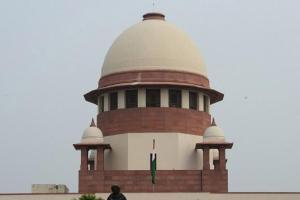The matter would be heard by a bench of Chief Justice Ranjan Gogoi, Justice Sanjay Kishan Kaul and Justice K.M. Joseph

Supreme Court
The Supreme Court is likely to commence hearing on a batch of petitions challenging the 2010 Allahabad High Court verdict trifurcating the disputed site at Ayodhya into three parts for Ram Lalla, Nirmohi Akhara and the original Muslim litigant.
ADVERTISEMENT
The matter would be heard by a bench of Chief Justice Ranjan Gogoi, Justice Sanjay Kishan Kaul and Justice K.M. Joseph.
The top court bench of then Chief Justice Dipak Misra, Justice Ashok Bhushan and Justice S. Abdul Nazeer by a majority of 2:1 while rejecting the plea challenging the High Court judgment had directed that the matter would be heard by a three-judge bench from October 29.
The majority judgement on September 27 held that a new constituted bench will commence hearing from October 29 on a batch of petitions filed by both the sides -- Hindu and Muslim stakeholders -- challenging the 2010 high court judgement.
The Muslim petitioners had pressed for hearing the challenge to the High Court judgment by a five-judge bench as the court had relied on a 1994 top court judgment that said that mosque was not essential to Islam for offering 'namaz'.
The three-judge bench while rejecting the plea had on September 27 said, "We are of the considered opinion that no case has been made out to refer the Constitution Bench judgment of this court in Ismail Faruqui case for reconsideration."
"We again make it clear that questionable observations made in the Ismail Faruqui's case ... were made in the context of land acquisition. Those observations were neither relevant for deciding the suits nor relevant for deciding these appeals," the majority judgement had said.
In his minority judgement, Justice Nazeer had said that the "questionable" observations in the Ismail Faruqui ruling were arrived at without undertaking a comprehensive examination. He had said a Constitution Bench must decide what constitutes essential practices of a religion and thereafter the Ayodhya land dispute should be heard.
Justice Nazeer also said that whether mosque was an essential part of Islam for offering namaz was to be decided considering the religious beliefs, and that requires detailed consideration.
"It is clear that the question as to whether a particular religious practice is an integral part of the religion is to be considered by the doctrine, tenets and beliefs of the religion," he observed.
He said the question of the 1994 Ismail Farooqi judgement needed to be referred to a larger Constitution Bench.
Catch up on all the latest Crime, National, International and Hatke news here. Also download the new mid-day Android and iOS apps to get latest updates
 Subscribe today by clicking the link and stay updated with the latest news!" Click here!
Subscribe today by clicking the link and stay updated with the latest news!" Click here!






